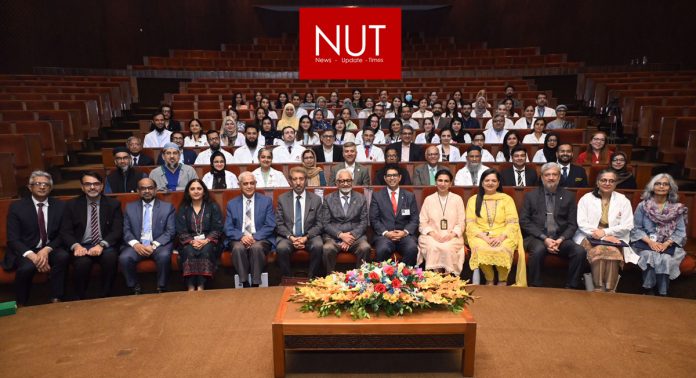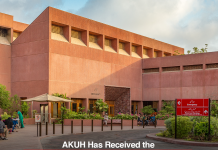Aga Khan University’s National Health Sciences Research Symposium places evidence-based medical guidelines at the forefront of discourse.
Karachi (Muhammad Yasir) The 25th National Health Sciences Research Symposium (NHSRS), AKU’s flagship conference, brought together national and international experts to further the dialogue on evidence-based medical guidelines. Given the pressing need for contextually relevant treatment for diseases, this conference was both timely and relevant, building upon existing work done by AKU’s Center for Clinical Best Practices (CCBP).
According to Dr Faisal Sultan, former special assistant to the prime minister on health, “it is a pleasure to be a part of this guideline development process that is being done in a structured and international validated manner with contextual appropriateness at its core. This is a great effort by AKU.”
Over 250 million people live in Pakistan, a country with a diverse range of cultures and ethnic groups. The lack of standardized clinical practices is a challenge, and our reliance on global guidelines and individual physician discretion hinders our ability to address Pakistan’s unique healthcare landscape. Crucial factors such as race, ethnicity, financial resources, and other social determinants of health have the potential to introduce biases into representative datasets, leading to variability in our clinical care. Therefore, this challenging landscape underscores the critical need for targeted interventions and screening measures which are lacking in international guideline sources.
To address this challenge, CCBP collaborated with over 150 specialists over four years to review, adapt, and create transparent and robust guidelines tailored to the local context, using an internationally derived ‘GRADE-ADOLOPMENT’ process, and a diverse advisory board. This Manual of Therapeutics aims to standardize clinical practice across several healthcare sectors, offering tangible solutions for optimal patient care from primary to tertiary levels. The keynote speaker, Professor Mahmood Ayyaz, Vice Chancellor, King Edward Medical University, Lahore emphasized the importance of evidence-based guidelines in clinical practice and the need to close the gap in global health disparities.
“The move from disease-oriented guidelines to community-oriented contextual guidelines is key but comes with its own set of challenges that need to be addressed. The system also needs to have maintenance and improvement mechanisms embedded within in,” said Professor Maj General Sohail Sabir during his plenary talk on challenges and their solutions in the development of contextual guidelines. Professor Sabir commended AKU’s leadership and training with military hospitals to ensure maximum impact and dissemination.
Professor Dr Javed Akram, President, Pakistan Society of Internal Medicine and Health Minister Punjab was also in attendance, providing crucial insights from his work as a medical professional as well as a government health official. “Health disparities exist around the world, but the issues that plague Pakistan are varied and many. The disease burden is alarming, and resources constrained with overwhelming volumes, so prevention is as important as the cure. Ethical, transparent locally adapted clinical guidelines rooted in research which integrate disease and patient oriented approaches is the way forward,” he said.
Prof Dr Khalid Masood Gondal, President, College of Physicians and Surgeons Pakistan; Professor Dr Rizwan Taj, President, Pakistan Medical and Dental Council; Dr Bushra Mirza, Member, Research, Development and Innovation, Higher Education Commission; Professor Dr Shabeen Naz Masood, Executive Member, Society of Obstetricians and Gynaecologists of Pakistan; and Major General Irfan Ali Mirza, Hilal e Imtiaz (Military), Dean AFPGMI; and Professor Dr Shehla Naseem, Member, National Advisory Board were some of the distinguished speakers at the symposium.
The symposium consisted of presentations on guideline development for common ailments such as diabetes and hypertension, along with robust panel discussions on the impact of guidelines on healthcare, oral presentations of shortlisted abstracts, poster presentations, awards, and recognition of all the specialists who contributed to the development of the manual of therapeutics.






